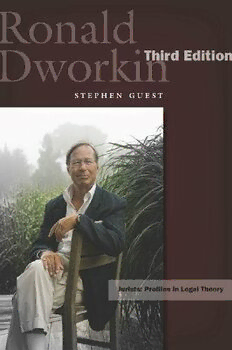
Ronald Dworkin PDF
Preview Ronald Dworkin
ronald dworkin Jurists: Profiles in Legal Theory William Twining, General Editor Ronald Dworkin third edition Stephen Guest stanford law books An Imprint of Stanford University Press Stanford, California Stanford University Press Stanford, California ©2013 by the Board of Trustees of the Leland Stanford Junior University. All rights reserved. The first and second editions of this book were published in 1992 and 1997 by Edinburgh University Press. Stephen Guest, 1992, 1997 No part of this book may be reproduced or transmitted in any form or by any means, electronic or mechanical, including photocopying and recording, or in any information storage or retrieval system without the prior written permission of Stanford University Press. Printed in the United States of America on acid-free, archival-quality paper Library of Congress Cataloging-in-Publication Data Guest, Stephen, author. Ronald Dworkin / Stephen Guest. -- 3rd ed. pages cm “The first and second editions of this book were published in 1992 and 1997 by Edinburgh University Press.” Includes bibliographical references and index. ISBN 978-0-8047-7232-7 (cloth : alk. paper) -- ISBN 978-0-8047-7233-4 (pbk. : alk. paper) 1. Dworkin, Ronald. 2. Law--Philosophy. 3. Jurisprudence. I. Title. K230.D92G83 2012 340’.1--dc23 2012016359 Typeset by Classic Typography in 10/13 Galliard Contents Preface vii Introduction 1 chapter one A Sketch of Ronald Dworkin 11 chapter two Law as Plain Fact 27 chapter three The Complexity of Legal Argument 45 chapter four The Interpretation of Law 65 chapter five The Evaluative Coherence of Legal Argument 83 chapter six Integrity and Community 101 chapter seven Objectivity in Law and Morality 124 chapter eight Treating People as Equals 144 vi Contents chapter nine Justice for Hedgehogs 159 chapter ten Equality of What? 182 chapter eleven The Basis of Liberalism 208 chapter twelve Religion and the Beginning and End of Life 225 Notes 245 Bibliography of Ronald Dworkin’s Works 271 Index 287 Preface Although I confidently stated in the Introduction to the second edition of this book in 1997 that there wouldn’t be a third edition, here in fact it is. Certainly the subject-matter justifies it. Dworkin has been prolific in the past 16 years, producing four important works, Sovereign Virtue (2000), Justice in Robes (2006), Is Democracy Possible Here? (2006) and, most nota- bly, his significant work Justice for Hedgehogs (2011), besides a large number of articles and lectures. It was the publication of Justice for Hedgehogs that persuaded me. That work is intended by him to stand with Law’s Empire (1986), Sovereign Virtue, Freedom’s Law (1996) and Justice in Robes to form one large opus containing his theory of ethics, his theory of morality, his theory of politics and his theory of law, in addition to establishing his inter- pretive method (which is his theory of reasoning on matters of value). And so this third edition is intended bring up to date an account of his work of almost half a century (his first published piece was in 1963). In particular, I hope readers will appreciate the significance in Justice for Hedgehogs of his clear endorsement of the Humean principle separating the empirical world from that of value. In a way, all else, especially concerning law, follows. I’m also motivated in returning to Dworkin by my continuing strong sense that he remains insufficiently challenged. It seems to me that serious writers only “pick” at his various views but don’t confront them with the attention they deserve. For example, in spite of so much sense in Hershow- itz’s recent collection of essays on Dworkin (the best collection, I think), many of the writers still don’t fully grasp what I think must have been obvi- ous before even the publication of Law’s Empire in 1986 but certainly after it, that Dworkin is not engaged in descriptive phenomenology (or, as he viii Preface calls it “taxonomic jurisprudence”). Dworkin’s idea that law is a subset of morality, coupled with his account of the unity of value, is powerful and compelling. It is “liberating” as he rather grandly says in Justice for Hedge- hogs. In this third edition, I have made more efforts to consider some of the contemporary criticisms. Mostly I find that the criticisms are not actually criticisms at all but misunderstandings or lazy thinking about what Dwor- kin has actually written. At any rate, where I’ve thought a criticism carried some reputational weight but misunderstood what Dworkin has said, I’ve made it my business to bring this to the attention of the reader. My overall aim is to make reading Dworkin more accessible to a wider audience, per- haps those who will get the immediate good sense of the theory and thus approach it in the right frame of mind. ronald dworkin
